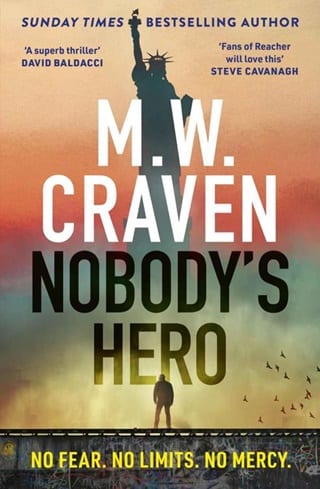Chapter 50
‘"Future threat" refers to identifying the things that might bite us on the ass in the next few years?' Koenig said. ‘And the "disruption" part refers to what can be done to stop said future threats from biting us on the ass?'
‘In a nutshell,' Carlyle confirmed. ‘It's an ongoing process, and part of it is that once a year a think tank is convened. An up-and-coming officer chooses around twenty individuals to spend a week doing blue-sky thinking. A no-idea-too-stupid kinda thing.'
Carlyle drained her tea and took a cookie. She bit into it without grimacing. Koenig thought she'd been in the UK for too long if she'd gotten used to custard creams.
‘Young officers traditionally use this week as a springboard. A chance to network with the men and women who might influence their careers. It takes place off base, usually a private residence.' She took another custard cream. Looked at it like she didn't know what it was. ‘The problem is, when you gather the usual people, you discuss the usual threats. They rely on their intelligence briefings to cast their minds forwards. China and Russia. Pandemics and cyberwar. Rogue states, or non-state bad actors, getting hold of weapons of mass destruction.'
‘The known knowns,' Draper said.
‘People ridiculed Rumsfeld at the time,' Carlyle said. ‘But I didn't. For all the tortured language, Rumsfeld made a valid point. In the concept of future threats, there are known knowns. China, for example, is a known threat. Iran getting hold of nukes is a known threat. Even hypothetical threats like ethnic bioweapons are known knowns. He was also correct when he said there are known unknowns . COVID-19 is an obvious example. We knew a pandemic could threaten our interests, but we didn't know what form it would take. It was a known unknown.'
She stopped and refilled her cup.
‘Two months before Mr Koenig faked my death, I'd arranged that year's Future Threat Disruption think tank,' she continued. ‘As they did every year, lobbyists and defence contractors were falling over themselves to host it. I was offered beachfront houses in the Hamptons, chalets in Aspen, superyachts, even a private island. In the end, I chose a French Colonial in a small town in New Hampshire.'
She looked at Koenig. She looked at Draper.
‘It was on a street called Acacia Avenue,' she said.
 Fullepub
Fullepub 



